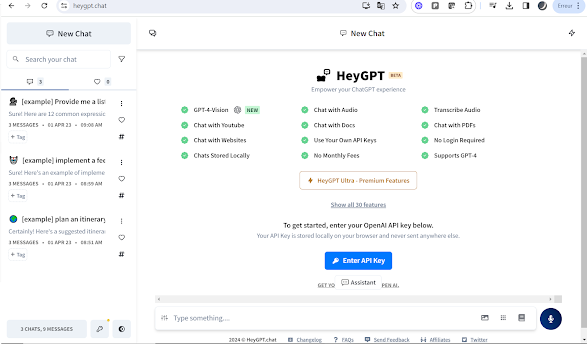Introduction
The field of research is undergoing a transformation because to artificial intelligence (AI), which is giving scientists new tools to examine, evaluate, and comprehend complicated data. Here are 5 AI tools that stand out among the plethora of options accessible because of their practicality and potential to transform research across a range of disciplines.
1. Chat GPT Plus : Un assistant conversationnel pour la recherche
With the help of Chat GPT Plus, an advanced conversational language model, you may create text, translate between languages, write a wide range of creative content, and get clear, concise answers to your questions. The researchers who require: This tool is quite helpful.
- Handle large amounts of text: Chat GPT Plus has the ability to summarize scientific publications, extract key information, and produce summary reports.
- Investigate concepts and develop hypotheses: His ability to communicate in an open and creative manner may help researchers discover new research avenues and develop fresh hypotheses.
- Communicating their findings in a more efficient manner: Chat GPT Plus has the ability to translate scientific publications into many languages, rewrite popularized articles, and create interactive presentations.

2. Scite Assist : Un assistant de recherche scientifique
Scite Assist is an IA tool that makes the laborious task of finding books easier. It makes it possible for scientists to:
- Locate relevant scientific articles: By taking into account the context, keywords, and citations, Scite Assist can help locate the most relevant scientific publications related to a research topic.
- Examine the scientific articles: This tool gathers information from publications, including methodology, results, and conclusions, and summarizes it.
- working along with other scientists: Scite Assist makes it easier to create research groups and to share publications and notes.
3. Hey GPT : Un outil de communication multi-plateforme
Hello GPT is a chatbot that works across several platforms, enabling searchers to communicate with voice assistants, websites, and messaging apps. This tool could be useful for:
- Acquire des renseignements rapidement: Hey GPT can provide straightforward and sophisticated answers in natural language, saving researchers time and allowing them to focus on their work.
- The automation of repetitive tasks With the help of this tool, information searching, note-taking, and task planning may all be automated.
- Maintaining communication with the scientific community: Hey GPT can be used to host webinars, participate in online forums, and keep track of researcher publications.
4. Elicit : Un outil d'exploration de données scientifiques
With the aid of an IA tool called Elicit, researchers can examine and analyze complex scientific data. It suggests features such as:
- Data extraction: Elicit is capable of extracting data from a variety of file types, including databases, Excel tables, and PDF files.
- Data analysis: the tool provides statistical and automatic learning tools for data visualization, trend identification, and prediction model generation.
- Relationship creation: Elicit enables the creation of interactive, personalized reports for sharing analysis results with other researchers.
5. LitMaps & Connected Papers : Des outils de visualisation de la littérature scientifique
It is possible to visualize the relationships between scientific papers using two tools: LitMaps and Connected Papers. They assist scientists in:
- Comprehend le paysage de la recherche : ces outils permettent d'identifier les articles les plus clés et influents en plus de visualiser les différentes branches d'un domaine de recherche.
- Discover some new research directions: Examining the links between publications might help researchers identify unexplored research areas and potential collaborative opportunities.
- Monitoring the growth of a field of study It is possible to see how a field of study changes over time and to keep track of emerging trends by using LitMaps and Connected Papers.

Conclusion
Thanks to the IA's wide range of tools, researchers may increase their productivity, discover new research avenues, and communicate more effectively. The tools that are offered here are not exclusive.







0 Comments